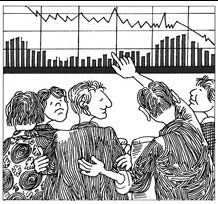Listening to the wisdom of investors
By Hong Liang (China Daily)Updated: 2007-07-17 07:08
When we cover an emerging stock market as diligent and knowledgeable reporters, well-versed in the basics of economics, we tend to favor rational explanations for the daily movements of share prices.
 In doing so, we sometimes forget that the stock market does not necessarily
behave rationally. Investor sentiment plays an important role in determining
share prices. This is particularly true in a market like the one on the Chinese
mainland, where individual investors account for a large share of the daily
turnover.
In doing so, we sometimes forget that the stock market does not necessarily
behave rationally. Investor sentiment plays an important role in determining
share prices. This is particularly true in a market like the one on the Chinese
mainland, where individual investors account for a large share of the daily
turnover.
Underlying economic fundamentals, such as the liquidity level, interest rates, inflation and corporate performance, will no doubt combine to determine the longer-term trend of the stock market. But day-to-day fluctuations are often the result of flows of short-term investment capital, which, in turn, depend heavily on the whims of the investing public.
There are times when the index is jerked either up or down by specific incidents. The most recent example was the increase in the stamp duty on May 30, which sent the Shanghai stock market indicator down a whopping 6.5 percent in one day.
But on most days, it is not so easy to explain why the market performs the way it does. This makes covering the mainland stock market a lot more challenging than covering the relatively more mature markets of, say, Hong Kong or Singapore. It is a lot more fun, too.
To cover the Chinese mainland stock market well, we must broaden our base of sources to include not only the usual economists, stock analysts and fund managers, but also financial planners, bank customer relations managers and habitual traders - people who buy and sell stocks for themselves. Of course, we need the economists and stock analysts to provide a solid base for understanding the broad market trends. But no serious observers of the mainland stock market can afford to ignore the collective sentiment of the many individual investors.
We read numerous news reports attributing the fall in
share prices to investors' worries about liquidity being sucked up by the
proposed government bond issue. When the share index continued to fall the
following day, fresh explanations were presented. This time, investors were
supposedly concerned about possible further action by the government to tighten
liquidity. 
Just as the market made a turnaround, we were told that investors' confidence had been boosted by either a bullish economic forecast, projected strong corporate performance or a renewed flood of liquidity into the stock market. We are not sure if these were the true explanations of investors' fast changing mood, or merely rationalizations by reporters and their market sources. Stock brokers can tell us what their clients are thinking. But the best way to find out is for the reporter to actually talk to the investors - the pensioners, taxi drivers and housewives.
The investors in Shanghai we have talked to seem to be more sanguine than many professional operators in the face of the increased market volatility. Few of them are thinking about withdrawing from the market. They do get jittery from time to time for reasons that may seem irrational to a trained economist or professional analyst. But most investors we talked to were confident that the market would continue to go up.
Some investors, especially those who entered the market at a late stage, have lost money. But margin trading, or buying shares with borrowed funds, is rare. For that reason, the occasional plunge in share prices in recent weeks has not created strong sell pressure. That explains why the stock market has typically recovered almost immediately after a sharp fall.
E-mail: jamesleung@chinadaily.com.cn
(China Daily 07/17/2007 page10)
|
|
|
|